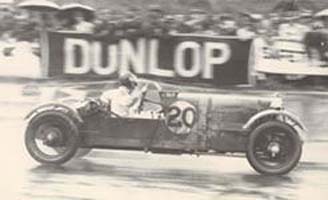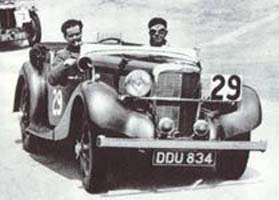Alvis cars were made to be driven hard. They respond well to enthusiastic handling and are capable of holding their own in modern traffic, even the pre-war models, if they are in good condition with all dynamic systems properly set up. If you just want an old car to polish up and potter down to the local show then it's a waste of an Alvis. Whilst few rely on an Alvis for their daily transport nowadays, there are some such as the Park Ward Three Litre cars, TD 21 onwards, which have performance, road holding and braking well up to modern standards provided they are in good order and on radial tyres. Just do not expect to blow off boy/girl racers in Escorts!

Straight 8 FrontWheel Drive
Over 4,000 Alvis cars are known to survive, and more continue to emerge with each passing year, though there must be a limit, unless people start making them again! (It has been said thatthere are more "W.O." Bentleys running now than ever left theCricklewood factory). In the UK the two main Alvis clubs are the
Alvis Owner Club (AOC) and the
Alvis Register and many Alvis enthusiasts are members of both clubs.
Support for Alvis owners is nothing short of fantastic. The Alvis Owner Club provides a level of technical support which sets the standard other vintage and classic car clubs aspire to in the form of spares location, spares production and practical maintenance advice for its members. The emphasis is on models from 1932 onwards. Earlier cars, 1920 - 1932 excluding the Firefly and Speed 20, are eligible for the Alvis Register, which supports these models with superb technical information and extensive new spares. Both clubs organise competitive and social events where a friendly and informal atmosphere prevails.

1938 12/70 Tourer
There are a number of firms, large and small, specialising in Alvis repairs and restorations. Many of these advertise regularly in Club publications. The straight forward design of the Alvis model, with the excellent standards of engineering and materials used, make them simple to repair and overhaul for those familiar with designs of the era. The most prominent firm is Red Triangle Auto Services Limited of Kenilworth, who took over spares and service provision shortly after Alvis ceased car production and who continue to offer an amazing range of parts, some original Alvis items, from their stock. New spares are produced to meet demand. The company has a large archive of original Alvis drawings allowing them to have parts made that should meet Alvis specifications. Red Triangle also undertake many aspects of Alvis restoration in its own workshops.
Other firms produce Alvis spares and undertake work on the cars. Many owners prefer to use local firms where they can keep an eye on the work being done (and the bills accruing!) from time to time, or use firms run by AOC members whom they know and trust. Club members will usually give advice freely about different firms' pros and cons and can often recommend the one most likely to meet another member's needs.
This simplicity of design and robust construction also makes Alvis cars popular with the DIY owner who likes to undertake his own mechanical and restoration work. Few, if any, special tools are needed and most Alvis components will continue to function even when thoroughly worn out, making a "rolling restoration" a feasible project.